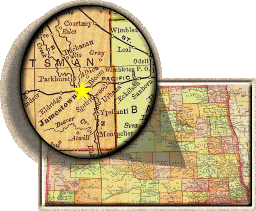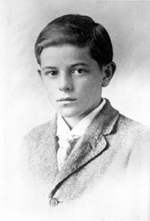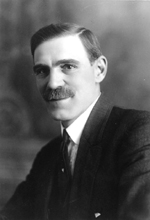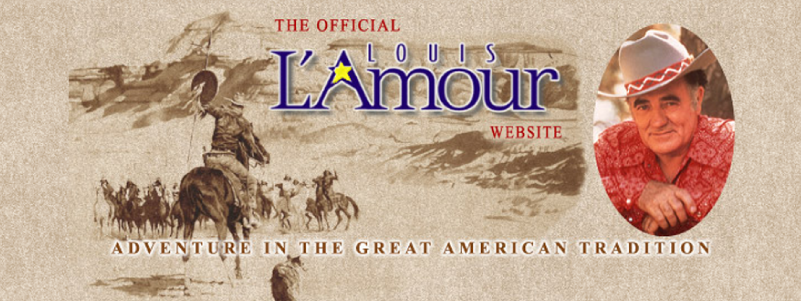Biography

 he man who
would become Louis L'Amour grew up in the fading days of the
American frontier. He was born Louis Dearborn LaMoore on March
22, 1908, the last of seven children in the family of Dr. Louis
Charles LaMoore and Emily Dearborn LaMoore. His home, for the
first fifteen years of his life, was Jamestown, North Dakota, a
medium sized farming community situated in the valley where
Pipestem Creek flows into the James River. Doctor LaMoore was a
large animal veterinarian who came to Dakota Territory in 1882.
As times changed he also sold farm machinery, bossed harvesting
crews, and held several positions in city and state government.
he man who
would become Louis L'Amour grew up in the fading days of the
American frontier. He was born Louis Dearborn LaMoore on March
22, 1908, the last of seven children in the family of Dr. Louis
Charles LaMoore and Emily Dearborn LaMoore. His home, for the
first fifteen years of his life, was Jamestown, North Dakota, a
medium sized farming community situated in the valley where
Pipestem Creek flows into the James River. Doctor LaMoore was a
large animal veterinarian who came to Dakota Territory in 1882.
As times changed he also sold farm machinery, bossed harvesting
crews, and held several positions in city and state government.
Though the land around Jamestown was mostly given to farming, Louis and his older brothers often met cowboys as they came through on the Northern Pacific Railroad, traveling to market with stockcars full of cattle or returning to their ranches in the western part of the North Dakota or Montana. For awhile Dr. L.C. LaMoore was a state Livestock Inspector, a post that required him to certify the health of all the cattle that came through the Jamestown area.
When Louis was very young his grandfather, Abraham Truman Dearborn, came to live in a little house just in back of the LaMoore's. He told Louis of the great battles in history and of his own experiences as a soldier in both the civil and Indian wars. Two of Louis' uncles had worked on ranches for many years, one as a manager and the other as an itinerate cowboy. It was in the company of men such as these that Louis was first exposed to the history and adventure of the American Frontier.

Louis at 12 years old.
Though the LaMoore household had a modest collection of books, it was at the nearby Alfred Dickey Free Library, where his eldest sister, Edna, was a librarian, that Louis spent many long hours exploring in depth subjects only touched on by the schools. He expanded his education by studying far afield of the local curriculum. In addition to the non-fiction study of history and the natural sciences, Louis was captivated by the fiction of Robert Louis Stevenson, Jack London, Edgar Rice Burroughs and others ... letting them carry him away to the south seas, the gold fields of the Yukon, the Spanish Main, the center of the earth and the dying red planet of Mars.
By the beginning of the 1920s Louis and his adopted brother John were the only children left in the LaMoore household. Edna, had moved away to pursue a career as a schoolteacher. His eldest brother, Parker, was on his way to becoming a successful newspaperman and political aid. Second brother, Yale, managed a grocery store where John and Louis occasionally worked. The twins, Clara and Clarice, had died while infants and his beloved sister Emmy Lou had succumbed to the 1918 epidemic of Spanish influenza.

My father,
Dr. L. C. La Moore
(He altered the spelling).
The members of the LaMoore family were intelligent, well read people and all of them had a hand in Louis' education. Emmy Lou had taught him how to read. His father taught him the ways and wiles of animals, a deep belief in hard work, and the fact that a man could always find a way to solve a problem. The basics of learning he got from his mother who had once trained as a schoolteacher, and from Edna who passed along her insights into libraries and research. Parker provided examples of a reporter's speed and simplicity of prose and the public relations savvy of a veteran political aid. Yale showed Louis a spirited love of life, a sharp judge of character, and a gift for improvisation. Louis' adopted brother John was a spunky street fighter from New York and an example of a natural survivor, quick of wit and sharp of tongue.




